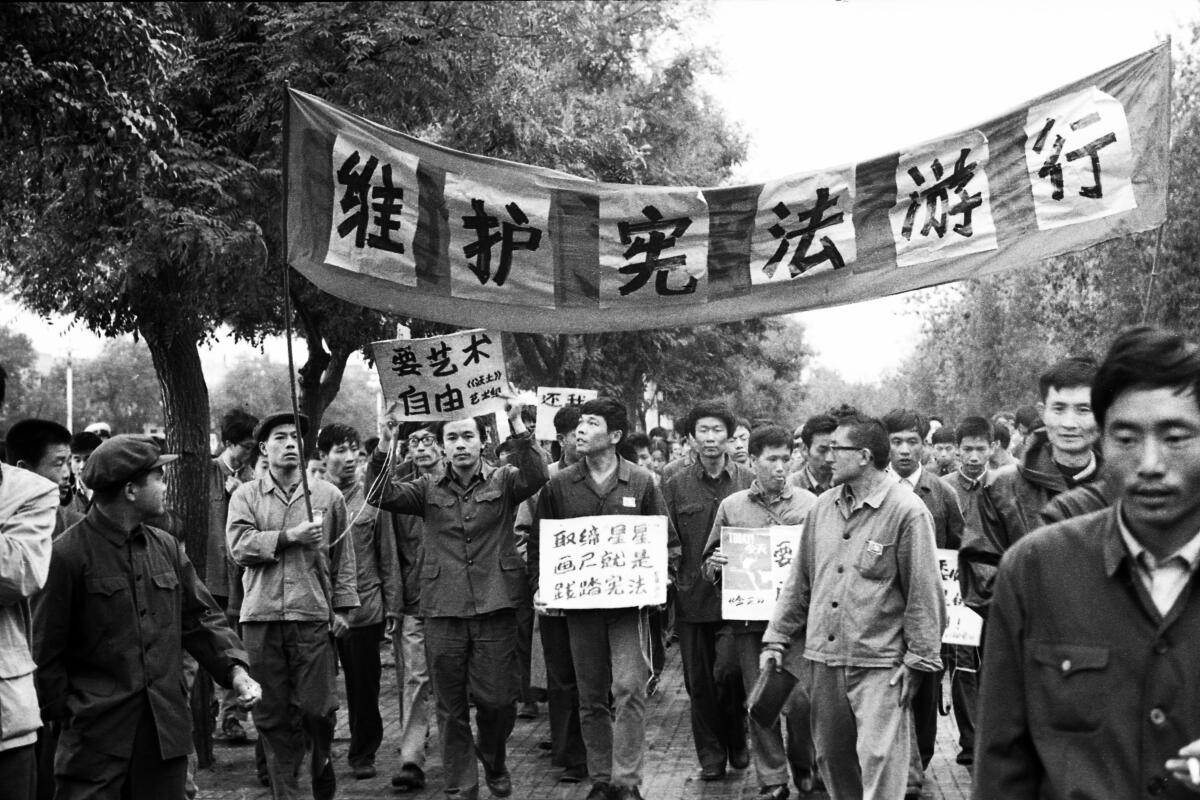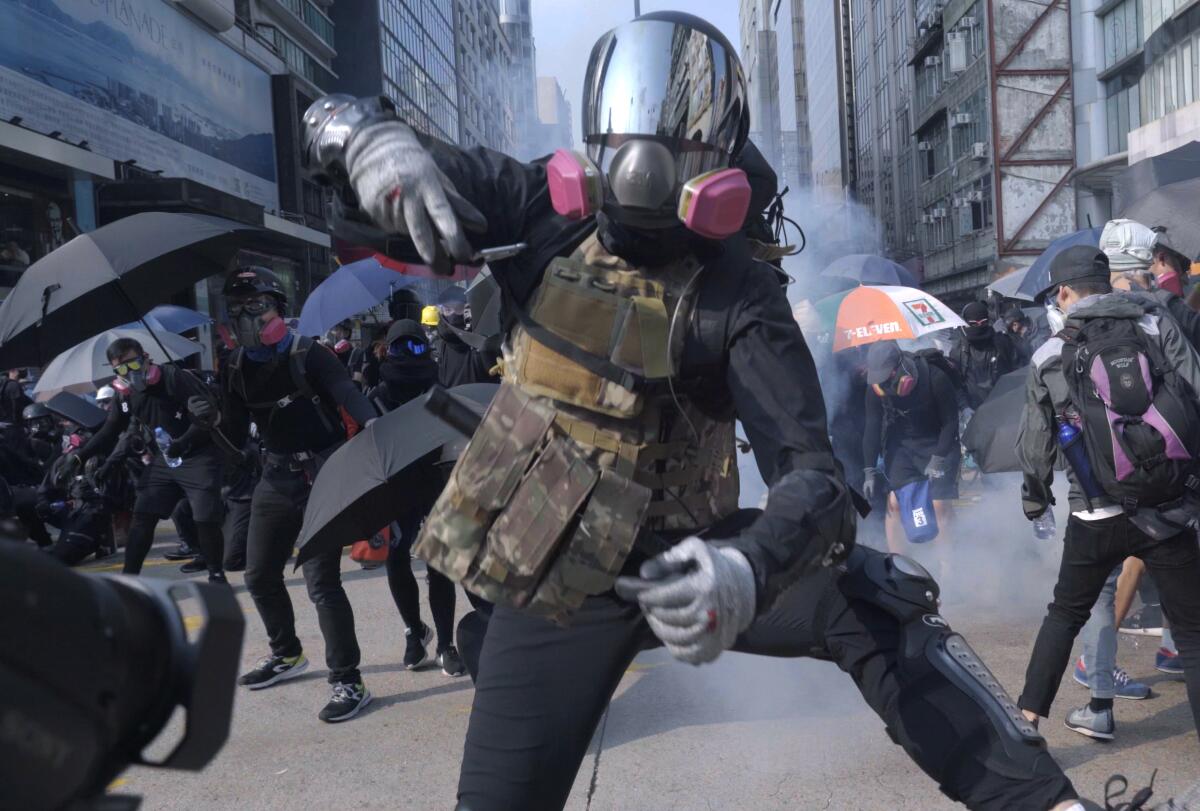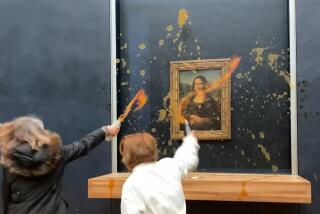Two documentaries distill the struggle of political dissent in China decades apart

- Share via
The Times is committed to reviewing theatrical film releases during the COVID-19 pandemic. Because moviegoing carries risks during this time, we remind readers to follow health and safety guidelines as outlined by the Centers for Disease Control and Prevention and local health officials.
The act of protesting in China is not to be entered into lightly considering the consequences: exile, imprisonment and worse. A pair of new documentaries takes us inside two of the more noteworthy, and globally recognized, stands against China’s authoritarian rule — an unsanctioned public art exhibit in 1979 organized by self-taught artists, their experiences fighting for individuality and democracy recounted in “Beijing Spring,” and, 40 years later, the citywide Hong Kong protests that challenged mainland China’s encroachment on the territory’s long-cherished autonomy, the subject of “Revolution of Our Times.”
“Beijing Spring,” from Andy Cohen and co-director Gaylen Ross, is about the Stars, a group of young Chinese artists who in the late ‘70s pushed back against the dominant propaganda art of the era to make modern-influenced paintings, wood carvings, drawings, poems and sculptures that often criticized China’s inhumane leadership but most importantly represented a new thirst for free expression.
The movie takes some time setting up the Cultural Revolution as the indoctrinating background they rebelled against, and how inspired the Stars were by the Democracy Wall — a street-long brick bulletin board of sorts that Deng Xiaoping briefly allowed as a means of protest in 1978 in his cagey attempt to separate himself from the recently deceased (and newly scrutinized) Mao Zedong. “Beijing Spring” takes off, however, when the interviewed artists — Ma Desheng, Li Shuang, Huang Rui, Wang Keping, Qu Leilei and Ai Weiwei, among others — become vivid chroniclers of their great triumph: a guerrilla exhibition of more than 150 of their pieces on the fence outside the National Art Gallery in Beijing, captured by filmmaker Chi Xiaoning in incredible black-and-white 16mm footage that’s been hidden from Chinese authorities for decades.
In posted notices imploring citizens to come see their show, which was quickly taken down by authorities, the Stars memorably called themselves “explorers” and their art “findings,” poetically suggesting that their work represented an existing individuality waiting to be awakened in citizens across China. Though modestly assembled, “Beijing Spring” benefits from its historical richness as a portrait of artistic dissent.

In Hong Kong, dissent has become a movement since its return to Chinese sovereignty in 1997. Filmmaker Kiwi Chow’s blistering dispatch, “Revolution of Our Times,” is a from-the-inside look at a handful of protesters — a high school-age volunteer medic, web-savvy student organizers, a septuagenarian farmer — among the millions in 2019 who fought against a proposed law that would have allowed extraditions to China, a blatant break from the “one country, two systems” principle meant to protect the territory’s freedoms.
With specificity, sweep and urgency, occasionally terrifying and bloody when capturing violent police tactics, Chow’s movie is a true epic of meaningful resistance. The street-level detail is gripping, from how strategically stationed protesters used the internet to communicate routes of escape and changes in tactics (“Be Water” was their mantra of flexibility), to the coordination and camaraderie among students and slightly older protesters that created a makeshift family with a “mom” and “dad” figure.
Hewing to a timeline of the months-long protests that culminated in the tear gas-versus-Molotov cocktail confrontations at university campuses, Chow also includes sobering, contextualized interviews with both knowledgeable eyewitnesses and his state-targeted subjects, many of whose faces are blurred or hidden to protect their identities. (The film’s premiere at Cannes this year, though planned for months, was announced right before the festival’s end to protect it from potential Beijing retaliation in the form of forced withdrawals of other Chinese filmmakers.)
Nearly all of the subjects interviewed in both films, we learn at each movie’s end, are in exile, which is telling. Chow has even lost touch with some of his interviewees, likely due to them going to prison, which was also the fate of a few of the Stars artists in the wake of their exhibition. “Beijing Spring” and “Revolution of Our Times” share another resonant detail — the fact that someone in each documentary pointedly invokes Mao Zedong’s famous phrase, “A single spark can start a prairie fire,” to characterize their own battle, this time for freedom from what Mao wrought.
'Beijing Spring'
In Chinese and English with English subtitles
Not rated
Running time: 1 hour, 40 minutes
Playing: Starts Dec. 10, Laemmle Playhouse 7, Pasadena
'Revolution of Our Times'
In Cantonese with English subtitles
Not rated
Running time: 2 hours, 31 minutes
Playing: Starts Dec. 10, Laemmle NoHo 7, North Hollywood
More to Read
Only good movies
Get the Indie Focus newsletter, Mark Olsen's weekly guide to the world of cinema.
You may occasionally receive promotional content from the Los Angeles Times.










